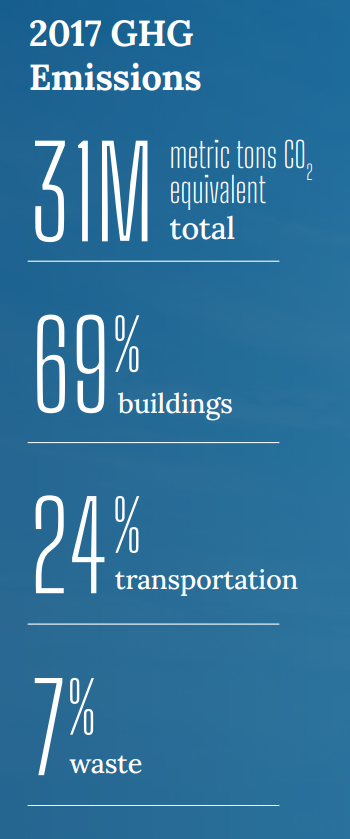Electrify Chicago
An independent tool for viewing City of Chicago building data
According to the
2022 Chicago Climate Action Plan,
69% of Chicago's emissions come from buildings, making
building emissions our biggest challenge and our biggest opportunity as a city
to tackle climate change. At Electrify Chicago, we showcase building performance using
publicly available data supplemented by community-submitted photographs and building
owners.
Start by looking at Chicago's buildings with the highest greenhouse gas intensity i.e. emissions per square foot. Large, efficient, buildings can perform much better than very inefficient small buildings on this metric.
New Article
📰 $30 Million In Missed Fines
The City Of Chicago failed to collect $30 million in potential fines from the building benchmarking ordinance, reducing transparency and accountability.
Legislative update! 🎉
As of late January 2024, legislation is being introduced to require new use more efficient forms of water and space heating, via the Clean And Affordable Buildings Ordinance (CABO), which will reduce the number of highly polluting and inefficient buildings that end up on this site.
If you're in Chicago,
write to your alderman to support the CABO!
Chicago Buildings by Greenhouse Gas Intensity
Note: Data includes large Chicago buildings with data from 2022, unless explicitly stated otherwise.
Note: This data only includes buildings whose emissions are reported
under the
Chicago Energy Benchmarking Ordinance. According to the City “As of 2016,
this list includes all commercial, institutional, and residential buildings larger than
50,000 square feet.” This dataset is also then filtered to only buildings with
reported emissions > 1,000 metric tons CO2 equivalent.
The latest year of data is from 2022, but we update the site regularly when new data is available, and some buildings may have failed to report that year, and only have older data available.
| Property Name / address | Primary Property Type |
Greenhouse Gas Intensity (kg CO2 eq./sqft) |
Total Greenhouse Emissions (metric tons CO2 eq.) |
|---|---|---|---|
|
1000 E 53RD ST
1000 E 53RD ST
| Multifamily Housing | 6.1 kg/sqft
Lowest 45%
| 843 tons
Lowest 48%
|
|
One East Scott Condo Association
1 E Scott St
| Multifamily Housing | 6.1 kg/sqft
Lowest 45%
| 1,120 tons
Highest 41%
|
|
1000 Condominium Association
1000 N Lake Shore Plz
| Multifamily Housing | 6.1 kg/sqft
Lowest 45%
| 2,452 tons
Highest 18%
|
|
1400 South Michigan
1400 S Michigan Ave
| Multifamily Housing | 6.1 kg/sqft
Lowest 45%
| 2,094 tons
Highest 22%
|
|
333 S Ashland Ave
333 S Ashland Ave
| Office | 6.1 kg/sqft
Lowest 45%
| 416 tons
Lowest 18%
|
|
5870 W LAKE ST
5870 W LAKE ST
| Multifamily Housing | 6.1 kg/sqft
Lowest 45%
| 305 tons
Lowest 9%
|
|
2438 2484 W ESTES AVE
🏆
2438 2484 W ESTES AVE
| Multifamily Housing | 6.1 kg/sqft
Lowest 45%
| 626 tons
Lowest 35%
|
|
Altgeld Club Condominium
🕰️
1350 W Fullerton Ave
| Multifamily Housing | 6.1 kg/sqft | 630 tons |
|
Illinois College of Optometry
🕰️
3241 S Michigan Ave
| College/University | 6.1 kg/sqft | 2,019 tons |
|
One Place Condominium Association
1 E 8th St
| Multifamily Housing | 6.1 kg/sqft
Lowest 45%
| 1,906 tons
Highest 24%
|
|
Chatham Park Village
🕰️
737 E 83rd Place
| Multifamily Housing | 6.1 kg/sqft | 2,834 tons |
|
Presidential Towers
🚩
555 W Madison St
| Multifamily Housing | 6.1 kg/sqft
Lowest 45%
| 12,830 tons #43 Highest
|
|
Bethel New Life Residences
🕰️
4950-4952 W Thomas St
| Multifamily Housing | 6.1 kg/sqft | 737 tons |
|
20 North Michigan Avenue
20 N Michigan Ave
| Office | 6.1 kg/sqft
Lowest 45%
| 1,309 tons
Highest 36%
|
|
Skyline Michigan Condominium Association
🕰️
1601 S MICHIGAN AVE
| Multifamily Housing | 6.1 kg/sqft | 336 tons |
Data Source:
Chicago Energy Benchmarking Data
